Video of boy falling out of moving van sparks discussion about use of child restraints
Video of boy falling out of moving van goes viral, sparks discussion about use of child restraints
A shocking video that captured the moment a toddler fell from a moving minivan onto a busy road led many people in China and around the world to slam the child's relatives. After the clip went viral, his family's poverty was revealed to the public, and many people offered to help them, including donating a child safety seat and a new car. Child travel safety is still a major issue in China, with child traffic accident mortality rates remaining high.
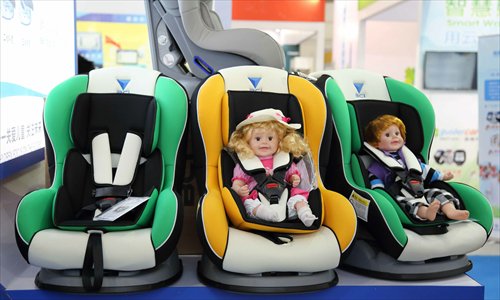
Child safety car seats on exhibition in Fuzhou, East China's Fujian Province, May 30, 2014 Photo: IC
Yang Defu, a migrant worker, never imagined he would be famous.
Last week, a 30-second dash cam video went viral on Chinese social media. In the video, the rear door of a minivan suddenly opens when the vehicle accelerates and a child falls out.
Amazingly, the toddler was not injured, thanks to the thick padded coat and trousers he was wearing. He quickly gets up and tries to chase the minivan, which drives away.
Yang was the minivan's driver and the kid is his 2-year old grandson. The accident occurred on the morning of February 27 on a busy street in Wujiang district, Suzhou, East China's Jiangsu Province.
Luckily, the driver of the car behind spotted the boy immediately and stopped his car. A passenger got out and carried the crying kid into their car, attempting to catch up with the minivan.
They gave Yang his grandson at the next crossing about 100 meters away, after the 52-year-old pulled over when other drivers shouted at him.
Two days later, a colleague of the driver of the car that picked up Yang's grandson posted the dash cam video of the incident online along with text explaining the story. The clip quickly went viral.
Scores of media outlets reported it, with television stations including China Central Television (CCTV) broadcasting the whole episode, showing the dash cam video, traffic surveillance video and an interview with Yang.
"I'm afraid people across the country possibly know me now. It is not a good reputation to have. I feel ashamed of myself," Yang told the Global Times on Tuesday via telephone.
There has been widespread criticism of Yang's irresponsibility and ignorance. The hashtag "Your kid has fallen" on Weibo has drawn 240 million views and 68,000 comments.
Yang makes no attempt to justify his carelessness. "The criticisms are right. I accept them," said Yang, who spent just five years in school.
Hailing from a village in Gushi county, a designated national-level poverty-stricken county in Central China's Henan Province, Yang said he moved to Suzhou with his wife and son in 2011 and sells vegetables. In 2013, his son got married and had a son in March 2014, who is now the darling of the whole family and largely cared for by Yang and his wife.
Many Chinese children are taken care of by their grandparents as their parents are busy working.
"He is very clingy," Yang said, adding that he had taken his grandson out in his minivan alone several times before and put him in the front passenger seat.
Yang says that he didn't know it was unsafe until the accident. The boy climbed into the back of the minivan and fell out when the rear door suddenly opened.
The video also went viral outside China. On youtube.com, the clip has attracted more than 205,000 views, with some saying that Yang should be arrested.
"I didn't know sitting in the front passenger seat is dangerous for children. I had never heard of child safety seats before," Yang said.
A sequence of screenshots shows the child falling from the minivan and being rescued and returned to his family on a road in Suzhou, Jiangsu Province:
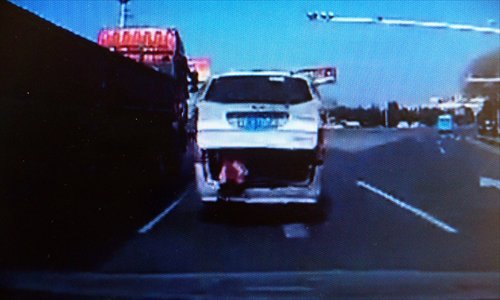
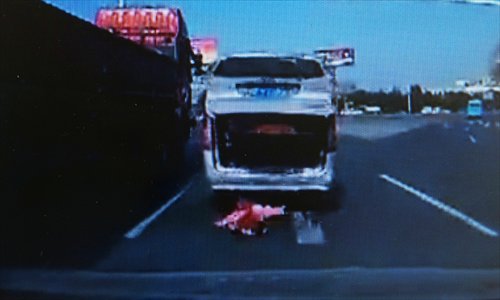
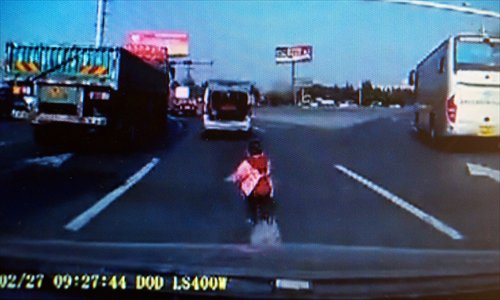
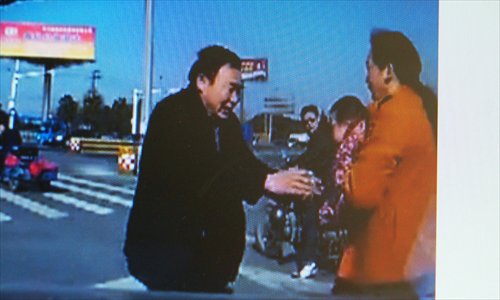
Unsafe on the road
China has no national laws on the use of child safety seats and people's awareness of child safety during driving is generally poor. A survey conducted last year by the General Administration of Quality Supervision, Inspection and Quarantine, the country's top quality watchdog, showed that although 81.9 percent of parents believe it is necessary to use child safety seats, less than 20 percent of families with young children that own cars were actually using such seats.
China Association of Automobile Manufacturers statistics show that China recorded sales of 24.6 million vehicles last year. But just 1 million child safety seats were sold, according to the Legal Daily.
Just a week after Yang's grandson took a tumble, on the evening of March 3 in Suqian city in Jiangsu Province, a woman surnamed Cui driving an electric motorcycle, with her daughter sitting in front of her and her three-year-old son sitting behind, waited at a set of traffic lights. Her son fell off when she started the bike, but she was unaware he had gone missing until she arrived at home, according to Modern New Express, a newspaper based in Jiangsu. A passerby discovered the boy and told the police.
According to traffic regulations, electric motorcycles are not allowed to take passengers. But this law is virtually never enforced, and violators are ubiquitous.
Yang and Cui were lucky. But many others are not. Official statistics show that each year more than 18,500 children under 14 die in traffic accidents in China, almost 16 times the number of such deaths in the US in 2013, even though China has almost the same number of registered vehicles as the US.
Quite a few people are concerned about the state of China's child safety legislation.
Zhou Qing, a professor of automotive engineering at Tsinghua University, told Legal Daily in a recent report that making the use of child safety seats compulsory would help reduce child mortality from traffic accidents. Citing a report by the WHO, child safety seats can reduce the risk of death by up to 70 percent.
Many countries have made the use of child restraints mandatory. In some countries like the US, UK, Sweden and Germany, the number of child traffic casualties greatly dropped after such laws were introduced, according to the report.
The Chinese government is also considering measures to improve child safety. In late 2014, a road safety official from the Ministry of Public Security announced that they had completed a feasibility study and were looking to incorporate the compulsory use of child restraints into national road safety laws.
The revision proposals have already been handed to the top legislature, and the draft is expected to be made public this July, according to China Automotive News.
While the central authorities have been slow-moving, several local administrations have accelerated ahead.
In 2014 and 2015, legislators in Shanghai, and Shandong and Zhejiang provinces all approved new rules saying that children under 12 shall not sit in front passenger seats and children under 4 must use safety seats. But none of them have listed specific penalties for violators.
Shenzhen, South China's Guangdong Province is an exception. In its road safety regulations revised in 2014, it clearly ruled that violators of its version of such rules will be fined 300 yuan ($46).
The quality of child safety seats is also a big concern. On taobao.com, a leading online shopping platform, the prices of child safety seats varies between 200 yuan and 13,000 yuan.
To regulate quality, China has started to enforce a strict quality assessment system for child safety seat makers since September 1 last year, and unverified products are not allowed to enter the market.
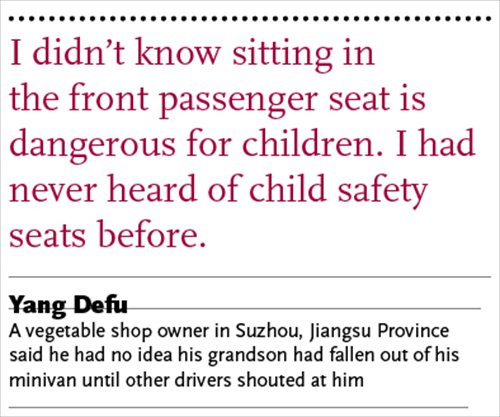
Helping the family out
When watching the video, Yang gasped. "I can't imagine what would have happened if those kindhearted people hadn't helped or if it happened somewhere else."
Yang hadn't been able to properly lock the rear door of his minivan since another car rear-ended him on February 22, Yang told the Global Times.
According to the Zhengzhou Evening News, Yang didn't ask for compensation for the collision. But mending the rear door costs up to 400 yuan, which is nearly a quarter of the couple's monthly income. "I had thought of going to get it fixed, but begrudged paying so much," he was quoted as saying by the newspaper.
Their vegetable shop is the major income source for the family, Yang said. Last year, his son tried to find a job and his daughter-in-law tried to run a stall selling breakfast foods, but both failed, he told the Global Times.
Deducting their regular expenditure of about 1,700 yuan for house and shop rent, payments for electricity and water each month, the family were able to save virtually nothing last year, he claimed.
Following CCTV's report, several entrepreneurs approached Yang, who lives with his wife, 26-year-old son, daughter-in-law and grandson in a rented bungalow in suburban Suzhou.
A dash cam video maker from Shenzhen donated a minivan and a child safety seat to him. A child safety seat manufacturer from Jiangsu also gave the family a child safety seat.
"There are so many great people. I feel very grateful for their kindness. I will use the safety seat from now on and mend the car immediately when it's broken," Yang promised.
Jiang Hongkun and Du Xiuli, the two Wujiang residents who rescued Yang's grandson, have also received awards. Local police awarded them 4,000 yuan each, according to local newspaper Wujiang Daily.
Newspaper headline: Toddler in traffic